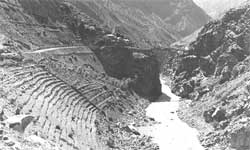Greening a state
 "if you look at the figures of the Van Mahotsav (forest festivals), you will find that millions of trees have been planted. But their survival rate has always been under question," says Prem Kumar Dhumal, chief minister of Himachal Pradesh. He talks in similar vein about the crores of rupees that have been sunk in development schemes so far, without producing any results. His solution to the problem: decentralise forest management and formally involve Non-governmental organisations ( ngo s) in developmental planning.
"if you look at the figures of the Van Mahotsav (forest festivals), you will find that millions of trees have been planted. But their survival rate has always been under question," says Prem Kumar Dhumal, chief minister of Himachal Pradesh. He talks in similar vein about the crores of rupees that have been sunk in development schemes so far, without producing any results. His solution to the problem: decentralise forest management and formally involve Non-governmental organisations ( ngo s) in developmental planning.
Ever since he took over as chief minister in March 1998, Dhumal, a professor-politician, has enacted or initiated several rules and policies aimed at enhancing people's participation and improving the environment. Dhumal's personal staff, top bureaucrats and ngo s of the state, say that the low-profile Bharatiya Janata Party leader is always open to new ideas. Critics say that he has no option. Twice member of parliament from Hamirpur constituency since 1984 and state party president since 1993, Dhumal has little experience in governance. But his pragmatic thinking has won him many admirers.
On December 14-15, 1998, he invited leading ngo s of the state for a two-day symposium to chalk out the modalities for government- ngo participation. "Without his personal initiative, it would not have been possible,' says Kulbhushan Upmanyu, a respected leader of the Save Himalaya Movement which is based in Mandi district. The chief minister takes personal interest in clearing environment programmes, says Rajwant Sandhu, secretary, forests, rural development and science and technology.
For example, he allocated Rs 10 crore from the state budget (of the state's total annual plan of Rs 1,440 crore) for a community forestry scheme. Under this plan, local communities manage the money and decide the mode of afforestation. He also set up several state-level consultative committees with ngo representation to ensure participatory development. He was instrumental in enacting the 1995 state law controlling non-biodegradable waste disposal which took effect from August 31, 1998 in cities, and from November 26, 1998 in villages. The government also banned the use of coloured, recycled plastic bags in the state with effect from January 1, 1999. Despite denudation of hill-slopes, forest area in the state grew last year.
The state has had four joint forest management schemes, aided by the World Bank and other international donors, but people's participation was absent. "There was no community participation. They were fund-driven, not need-driven,' says Iqbal Singh, an activist with Society for Advancement of Village Economy, an ngo based in Mandi. But the new community forestry project in the state ( Sanjhi Van Paryojana ) involves the people in these programmes.
A close examination of the new projects in the state reveal how environment programmes can succeed by maximum people's participation and minimal bureaucratic hurdles.
GIVING FORESTS TO THE PEOPLE: The state has four major afforestation projects which has funding of hundreds of crores. These projects had to have "people's participation' due to the insistence of donors. But the forest department's version of participation hardly met people's expectations. "The government experiments, but the community often suffers,' notes Singh. For instance, the park project in Kulu ousted many families, inviting a lot of criticism. In turn, ngo s opposed Joint forest management ( jfm ) projects.
But under the Community Forestry Project, micro-planning of the area is done with the help of ngo s, says Sandhu. Units of 30 to 100 families can form a community, elect their representatives, get themselves registered as a society and handle their account for the project. Each community can decide what kind of activity is needed in their area
Related Content
- Order of the National Green Tribunal regarding the deplorable condition of a water tank, Golconda Fort, Hyderabad, Telangana, 05/06/2025
- Order of the National Green Tribunal in the matter of Futala lake pollution, Nagpur, Maharashtra, 05/06/2025
- Order of the National Green Tribunal regarding large scale felling of toddy yielding palm trees in Bihar, 05/06/2025
- Order of the National Green Tribunal regarding an illegal cracker unit in Thanjavur district, Tamil Nadu, 29/05/2025
- Order of the National Green Tribunal regarding pollution of Godavari river, Telangana, 29/05/2025
- Order of the National Green Tribunal regarding violation of environmental norms by a tyre pyrolysis plant, village Sakauti, Shamli, Uttar Pradesh, 28/05/2025
